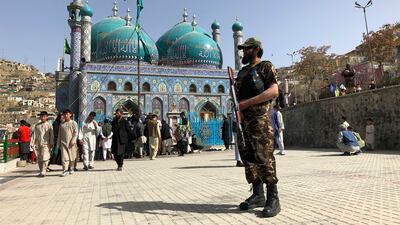In a scathing report released on Monday, the UN condemned the Taliban for their implementation of public executions, lashings and stonings since their takeover of Afghanistan in 2021.
The report called for the immediate cessation of such practices, saying Afghanistan's legal system was “failing to safeguard minimum fair trial and due process guarantees”.
In the past six months, the UN said 274 men and two boys had been publicly flogged for a variety of offences, including illicit sexual relations, running away from home, theft, homosexuality, consuming alcohol, fraud and drug trafficking.
The UN said the use of corporal punishment “increased significantly” after Zabihullah Mujahid, a spokesman for the Taliban authorities, tweeted on November 13 last year that the group's supreme leader had met with judges to emphasise their obligation to carry out such punishments.
Punishments have included lashings, beatings, amputations and executions by shooting, beheading and hanging.
Fiona Fraser, human rights chief for the UN Assistance Mission in Afghanistan, said corporal punishment is a breach of the Convention against Torture — of which Afghanistan is a signatory — and must cease.
She added that the world body is strongly opposed to the death penalty and called on the Taliban to establish an “immediate moratorium” on executions.
Unama noted that these punishments are not new.
Beginning in 2005, as the Taliban expanded its control over various regions, it established alternative systems of justice in those areas, enacting punishments such as lashings, amputations and executions with the aim of exerting greater control and enforcing strict adherence to the Taliban's interpretation of Sharia.
The mission also warned that the Taliban’s refusal to grant licences to female defence lawyers and the exclusion of women judges from the judicial system are negatively affecting women and girls.
The Taliban's first public lashing was documented in October 2021 in the northern Kapisa province, according to the report.
The punishment was administered to a man and woman who had been found guilty of adultery, with both receiving 100 lashes in the presence of local Taliban officials and religious scholars.
In December 2022, the Taliban authorities carried out their first public execution since seizing power, putting to death an Afghan citizen who was convicted of murder.
The execution was conducted by the victim's own father.
“So long as the Taliban shows disdain for international human rights law, these barbaric practices are likely to continue,” said Patricia Grossman, director of Human Rights Watch Asia.
She urged governments who are engaging with the Taliban, including UN Security Council members, to press for an end to “these abuses and make clear that international sanctions will remain in place and could be expanded if they continue”.



